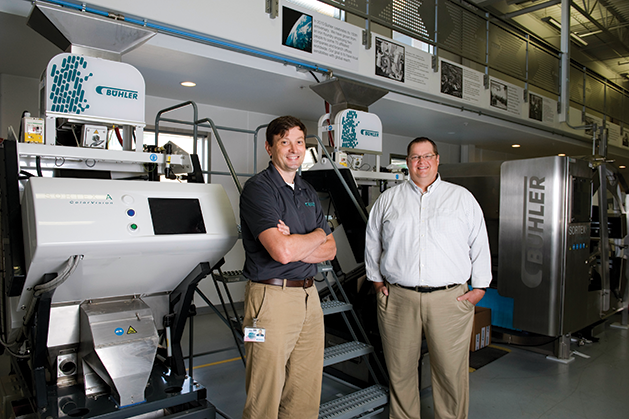
Pasta and chocolate fall onto many people’s lists of favorite foods. Have you ever thought about where the equipment used to fabricate the products is designed and built? There’s a good chance that the pasta and chocolate in our kitchens have some connection to the Swiss-based international company, Buhler Inc., which has a plant in Plymouth.
Buhler manufactures the equipment that produces many of the food products that we enjoy daily. Buhler also creates technology and machinery that are used in producing flour, animal feed and pet food. Buhler also designs and makes machinery that tests food products.
Buhler opened its Minnesota plant in 1957, its first in the U.S. “Buhler’s first plant in Minnesota was in Minneapolis, because that was the center for flour milling at the time,” says Brian William, Buhler’s vice president for marketing in North America. We work with companies that deal with flour and grain. Now companies like General Mills and Cargill have their headquarters close to Plymouth, so we want to be nearby,” says Williams.
One of Buhler’s current focuses is creating technology and equipment for specialty milling—milling of non-wheat ingredients like corn, oats and pulses such as chick peas, lentils and dry beans, which are high in protein and other nutrients.
“Non-wheat products are a growing market,” says Henrique Oliveira, marketing communication manager for the U.S. and Canada. Oliveira explains that one reason for the growth of specialty milling is the expansion of the market for gluten-free foods. “A lot of the gluten-free products now are made mainly with rice flour,” says Oliveira. Rice flour-based products are often high in calories and low in nutrients, so specialty milling is important to supply more nutritious products, Oliveira explains.
Trying to avoid gluten in your diet? If you’re choosing foods labeled as gluten-free or need to avoid products with certain allergens, it’s likely that the equipment used to test whether gluten and allergens are present in a product was manufactured by Buhler.
Ever notice that the generic product and the brand name don’t taste exactly alike, no matter what your mother told you? The generic product may taste good, but, the formulas for the generic and the brand name are different.
"Take Cheerios, for example," explains Williams. "The generic version may taste close, but it’s not exactly the same. That’s the value of the product—that it’s unique." Buhler creates the technology that measures the precise amount of each ingredient during the manufacturing of several products. What’s the difference exactly between Cheerios and the generic versions? Williams can’t say—the formulas are closely guarded trade secrets.
About 300 employees work in the Plymouth location. Because Buhler is a global company, there are some employees from other countries, but most are local, says Oliveira.
Buhler is also involved in programs that give back to the community, like drives to collect school supplies for kids that need them. Buhler also donates to United Way and supports Plymouth fire and police departments. The company has also donated equipment to University of Minnesota, and has donated funds for teaching positions at Iowa State University, which is a leader in animal feed research, says Williams.









